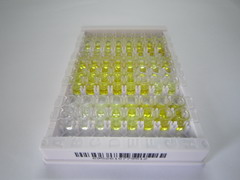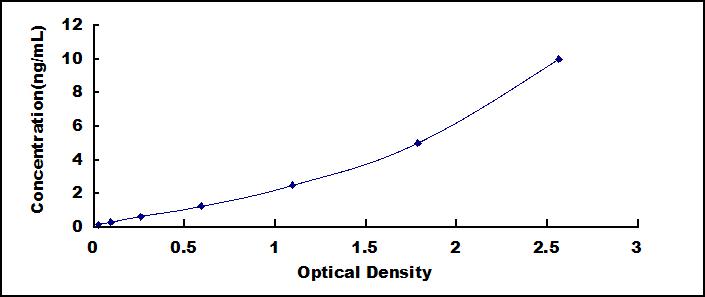Packages (Simulation)

Reagent Preparation

Image (I)
Image (II)
Certificate


ELISA Kit for Surfactant Associated Protein G (SPG)
SP-G; SFTPG; SFTA2; Surfactant Associated 2
- Product No.SED755Hu
- Organism SpeciesHomo sapiens (Human) Same name, Different species.
- Sample Typeserum, plasma, tissue homogenates, cell lysates, lung lavage fluid, cell culture supernates and other biological fluids
- Test MethodDouble-antibody Sandwich
- Assay Length3h
- Detection Range0.156-10ng/mL
- SensitivityThe minimum detectable dose of this kit is typically less than 0.062ng/mL.
- DownloadInstruction Manual
- UOM 48T96T 96T*5 96T*10 96T*100
- FOB
US$ 490
US$ 700
US$ 3150
US$ 5950
US$ 49000
For more details, please contact local distributors!
Specificity
This assay has high sensitivity and excellent specificity for detection of Surfactant Associated Protein G (SPG).
No significant cross-reactivity or interference between Surfactant Associated Protein G (SPG) and analogues was observed.
Recovery
Matrices listed below were spiked with certain level of recombinant Surfactant Associated Protein G (SPG) and the recovery rates were calculated by comparing the measured value to the expected amount of Surfactant Associated Protein G (SPG) in samples.
| Matrix | Recovery range (%) | Average(%) |
| serum(n=5) | 78-93 | 83 |
| EDTA plasma(n=5) | 90-104 | 93 |
| heparin plasma(n=5) | 96-105 | 101 |
Precision
Intra-assay Precision (Precision within an assay): 3 samples with low, middle and high level Surfactant Associated Protein G (SPG) were tested 20 times on one plate, respectively.
Inter-assay Precision (Precision between assays): 3 samples with low, middle and high level Surfactant Associated Protein G (SPG) were tested on 3 different plates, 8 replicates in each plate.
CV(%) = SD/meanX100
Intra-Assay: CV<10%
Inter-Assay: CV<12%
Linearity
The linearity of the kit was assayed by testing samples spiked with appropriate concentration of Surfactant Associated Protein G (SPG) and their serial dilutions. The results were demonstrated by the percentage of calculated concentration to the expected.
| Sample | 1:2 | 1:4 | 1:8 | 1:16 |
| serum(n=5) | 93-103% | 99-105% | 78-92% | 93-101% |
| EDTA plasma(n=5) | 80-92% | 83-102% | 85-99% | 80-98% |
| heparin plasma(n=5) | 96-104% | 86-101% | 86-102% | 78-93% |
Stability
The stability of kit is determined by the loss rate of activity. The loss rate of this kit is less than 5% within the expiration date under appropriate storage condition.
To minimize extra influence on the performance, operation procedures and lab conditions, especially room temperature, air humidity, incubator temperature should be strictly controlled. It is also strongly suggested that the whole assay is performed by the same operator from the beginning to the end.
Reagents and materials provided
| Reagents | Quantity | Reagents | Quantity |
| Pre-coated, ready to use 96-well strip plate | 1 | Plate sealer for 96 wells | 4 |
| Standard | 2 | Standard Diluent | 1×20mL |
| Detection Reagent A | 1×120µL | Assay Diluent A | 1×12mL |
| Detection Reagent B | 1×120µL | Assay Diluent B | 1×12mL |
| TMB Substrate | 1×9mL | Stop Solution | 1×6mL |
| Wash Buffer (30 × concentrate) | 1×20mL | Instruction manual | 1 |
Assay procedure summary
1. Prepare all reagents, samples and standards;
2. Add 100µL standard or sample to each well. Incubate 1 hours at 37°C;
3. Aspirate and add 100µL prepared Detection Reagent A. Incubate 1 hour at 37°C;
4. Aspirate and wash 3 times;
5. Add 100µL prepared Detection Reagent B. Incubate 30 minutes at 37°C;
6. Aspirate and wash 5 times;
7. Add 90µL Substrate Solution. Incubate 10-20 minutes at 37°C;
8. Add 50µL Stop Solution. Read at 450nm immediately.
GIVEAWAYS
INCREMENT SERVICES
-
 Single-component Reagents of Assay Kit
Single-component Reagents of Assay Kit
-
 Lysis Buffer Specific for ELISA / CLIA
Lysis Buffer Specific for ELISA / CLIA
-
 Quality Control of Kit
Quality Control of Kit
-
 ELISA Kit Customized Service
ELISA Kit Customized Service
-
 Disease Model Customized Service
Disease Model Customized Service
-
 Serums Customized Service
Serums Customized Service
-
 TGFB1 Activation Reagent
TGFB1 Activation Reagent
-
 Real Time PCR Experimental Service
Real Time PCR Experimental Service
-
 Streptavidin
Streptavidin
-
 Fast blue Protein Stain solution
Fast blue Protein Stain solution -
 Single-component Reagents of FLIA Kit
Single-component Reagents of FLIA Kit
-
 Streptavidin-Agarose Beads
Streptavidin-Agarose Beads
| Magazine | Citations |
| Molecular Neurobiology | Localization, Occurrence, and CSF Changes of SP-G, a New Surface Active Protein with Assumable Immunoregulatory Functions in the CNS Pubmed:30032421 |
| Biomolecules | Surfactant Protein-G in Wildtype and 3xTg-AD Mice: Localization in the Forebrain, Age-Dependent Hippocampal Dot-like Deposits and Brain Content Pubmed:35053244 |
| Int J Mol Sci | Regionally Altered Immunosignals of Surfactant Protein-G, Vascular and Non-Vascular Elements of the Neurovascular Unit after Experimental Focal Cerebral … Pubmed:35682557 |
| Catalog No. | Related products for research use of Homo sapiens (Human) Organism species | Applications (RESEARCH USE ONLY!) |
| RPD755Hu01 | Recombinant Surfactant Associated Protein G (SPG) | Positive Control; Immunogen; SDS-PAGE; WB. |
| PAD755Hu01 | Polyclonal Antibody to Surfactant Associated Protein G (SPG) | WB |
| SED755Hu | ELISA Kit for Surfactant Associated Protein G (SPG) | Enzyme-linked immunosorbent assay for Antigen Detection. |
| LMD755Hu | Multiplex Assay Kit for Surfactant Associated Protein G (SPG) ,etc. by FLIA (Flow Luminescence Immunoassay) | FLIA Kit for Antigen Detection. |






